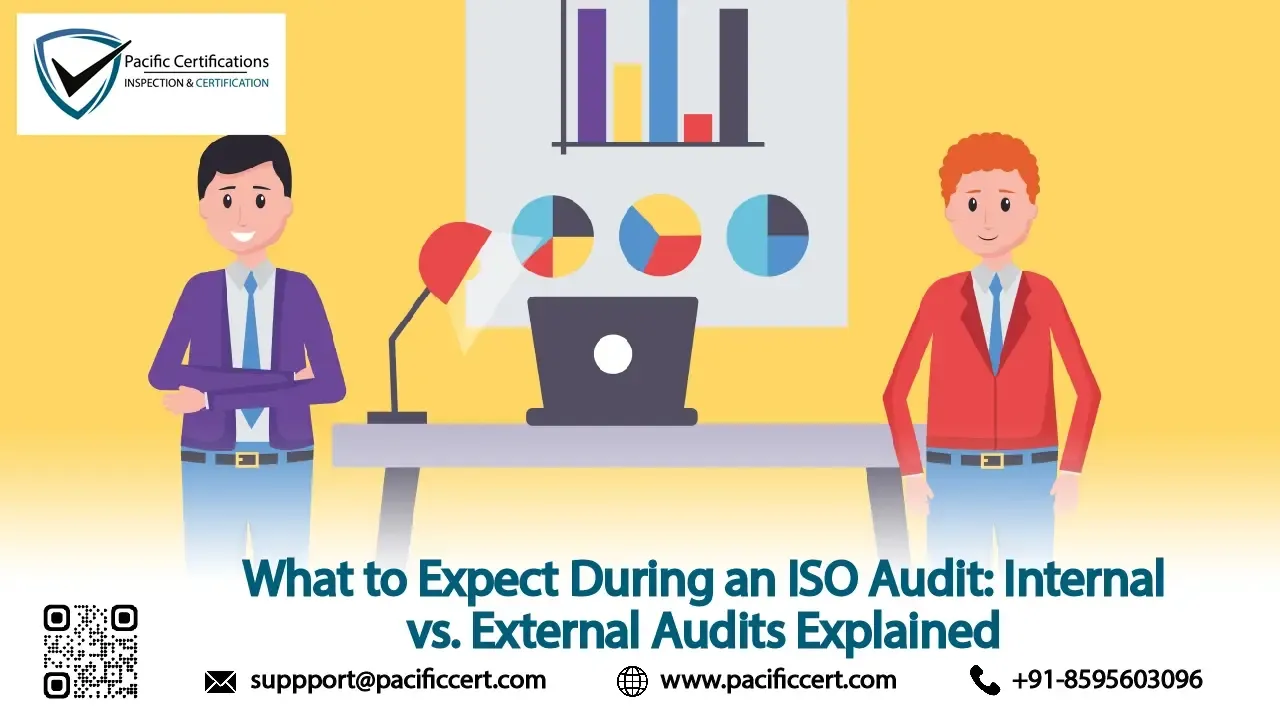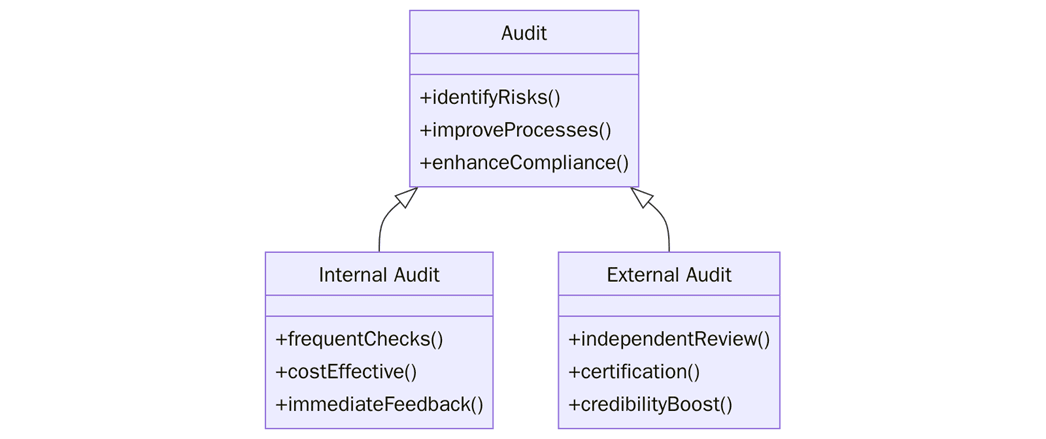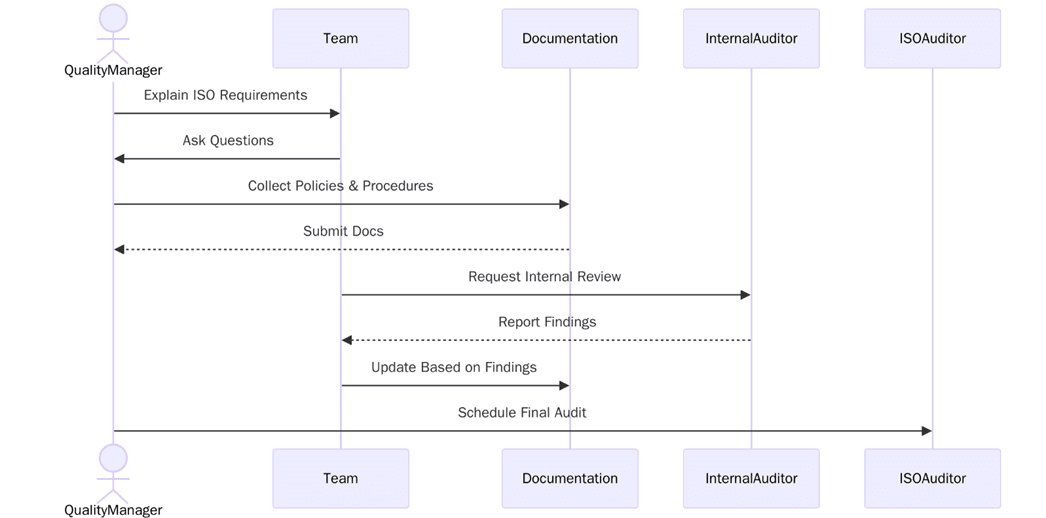What to Expect During an ISO Audit: Internal vs. External Audits Explained

Quick Summary
In this guide, ISO audits are explained in plain terms with a clear split between internal and external audits. Internal audits are run by your team to check processes, spot gaps early and get ready for certification. External audits are carried out by an accredited certification body in two stages—Stage 1 document review and Stage 2 on-site assessment—with any nonconformities to be closed to achieve or maintain certification. The article also highlights benefits such as improved readiness, fewer surprises, and better assurance for clients, while providing a simple preparation checklist covering documentation, training, and review of corrective actions to strengthen compliance and long-term business performance.
Introduction
ISO audits are formal assessments that determine whether your organization is complying with the requirements of the ISO standard it has implemented. Audits can help identify gaps in your processes, verify opportunities for improvement, and provide confidence to interested stakeholders that your organization maintains globally recognized processes. Some audits are conducted internally by members of the organization, while others are conducted externally by an accredited certification body. Understanding what to expect from each type of audit aids in preparing for and executing the audit as well as achieving positive results. They also boost credibility, improve decision-making, enhance employee awareness, support global market access, and strengthen long-term sustainability.
ISO audits are important checkpoints for organizations wishing to achieve or maintain ISO certification. They will determine whether your systems, processes and practices are in accordance with the relevant ISO standards, assisting organizations to continuously improve on their consistency, quality and compliance. It is critical to understand the differences between internal audits and external audits in order to prepare effectively and leverage the results to improve the effectiveness of your organization.
For more information, contact us at [email protected].
Internal Audits
Internal audits are conducted by employees or designated auditors within the organization to assess compliance to ISO standards. They are a proactive way to take stock of processes, review documents, and check that the organization is ready for external audits.
In general, there are three main purposes for the internal audits and that are: to verify compliance to ISO standards and internal procedures, to find non-conformities or gaps in systems before an external audit and to help with continuous improvement by highlighting areas that need improvement
The internal audits are usually a planned activity using a documented process, where the process documents and employees are reviewed. They are not for certification purposes; they are a prepared step so that the organization will be ready. Many organizations will use this time to improve their processes, revise documentation and fix any pending NCRs (Non-Conformance Assessments) prior to external audits.
External Audits
External audits and certifications are conducted by independent certifying organisations and are importance if you want to receive or maintain ISO certification. External audits tend to be more formal and extensive than internal audits and represent a third-party assessment of how your organization is performing compared to ISO standards.
The external audit process typically includes Stage 1 Audit (Document Review): The stage where the auditor reviews your documented system, policies, procedures, and other material to confirm that documents meet the requirements of ISO (standard) and Stage 2 Audit (Onsite assessment): The stage where the auditor asses your actual processes, interviews staff, directly observes operations and evaluates your "completeness" against the requirements of the standard.
External audits typically conclude with formal findings. The findings can include a non-conformity report (NCR) that must be addressed in a prescribed time period. Successful completion of the audit indicates that your organization has satisfied the standard and subsequently allows the certifying agency to issue or maintain your ISO certification.
For more information, contact us at [email protected].
What are the Key Differences Between Internal and External Audits?
What are Benefits of Internal and External Audits?
Implementing internal and external audits within your ISO management system brings tangible advantages to organizations. These audits not only help identify gaps and areas for improvement but also strengthen the credibility of your management system, building trust with clients, regulators and stakeholders. Below are some of the key benefits:

They assist in guaranteeing your organization is consistently compliant with the ISO standards.
Audits reveal inefficiencies and gaps so organizations can make targeted improvements.
Conducting audits regularly increases employee knowledge of the relevant process and their responsibilities.
Internal audits will make external audits easier, with less chance of NCR.
External audits provide an independent assurance that your organization is complying with the standards, increasing customer and stakeholder trust.
How to Prepare for an ISO Audit?
Proper preparation ensures audits are smooth and effective. Key steps include:

Reviewing policies, procedures and other documentation relevant to the ISO standard
Carrying out internal audits to find gaps prior to external audits
Training employees on knowing their roles and responsibilities
Keeping records of process, compliance checks and corrective actions up to date
Following up on past NCRs to show evidence of improvement
Preparation not only reduces audit stress but also positions the organization for successful certification and ongoing compliance.ISO audits improve compliance, strengthen processes, reduce risks, build trust, increase efficiency, support growth, and maintain certification readiness.
Contact Us
Pacific Certifications assists organizations in preparing for both internal and external ISO audits. Our team can help you develop audit schedules, conduct readiness assessments, and ensure your processes meet ISO standards.
Contact us at [email protected] or visit www.pacificcert.com to learn more about audit preparation and ISO certification services.
Read more: Pacific Blogs

